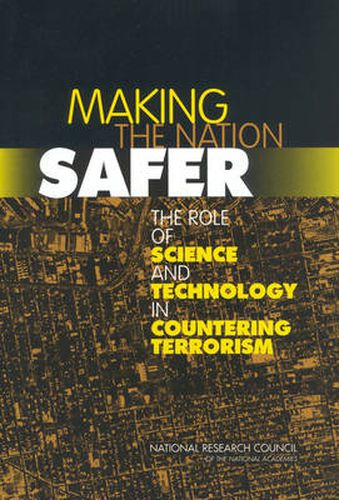Readings Newsletter
Become a Readings Member to make your shopping experience even easier.
Sign in or sign up for free!
You’re not far away from qualifying for FREE standard shipping within Australia
You’ve qualified for FREE standard shipping within Australia
The cart is loading…






Vulnerabilities abound in US society. The openness and efficiency of our key infrastructures - transportation, information and telecommunications systems, health systems, the electric power grid, emergency response units, food and water supplies and others - make them susceptible to terrorist attacks. This text discusses technical approaches to mitigating these vulnerabilities. A broad range of topics are covered in the book, including: nuclear and radiological threats, such as improvised nuclear devices and dirty bombs ; bioterrorism, medical research, agricultural systems and public health; toxic chemicals and explosive materials; information technology, such as communications systems, data management, cyber attacks and identification and authentication systems; energy systems, such as the electrical power grid and oil and natural gas systems; transportation systems; cities and fixed infrastructures, such as buildings, emergency operations centres and tunnels; the response of people to terrorism, such as how quality of life and morale of the population can be a target of terrorists and how people respond to terrorist attacks; and linked infrastructures, i.e. the vulnerabilities that result from the interdependencies of key systems. In each of these areas, there are recommendations on how to immediately apply existing knowledge and technology to make the nation safer and on starting research and development programmes that could produce innovations that will strengthen key systems and protect us against future threats. The book also discusses issues affecting the government’s ability to carry out the necessary science and engineering programmes and the important role of industry, universities and states, counties, and cities in homeland security efforts. A long term commitment to homeland security is necessary to make the nation safer, and this book lays out a roadmap of how science and engineering can assist in countering terrorism.
$9.00 standard shipping within Australia
FREE standard shipping within Australia for orders over $100.00
Express & International shipping calculated at checkout
Vulnerabilities abound in US society. The openness and efficiency of our key infrastructures - transportation, information and telecommunications systems, health systems, the electric power grid, emergency response units, food and water supplies and others - make them susceptible to terrorist attacks. This text discusses technical approaches to mitigating these vulnerabilities. A broad range of topics are covered in the book, including: nuclear and radiological threats, such as improvised nuclear devices and dirty bombs ; bioterrorism, medical research, agricultural systems and public health; toxic chemicals and explosive materials; information technology, such as communications systems, data management, cyber attacks and identification and authentication systems; energy systems, such as the electrical power grid and oil and natural gas systems; transportation systems; cities and fixed infrastructures, such as buildings, emergency operations centres and tunnels; the response of people to terrorism, such as how quality of life and morale of the population can be a target of terrorists and how people respond to terrorist attacks; and linked infrastructures, i.e. the vulnerabilities that result from the interdependencies of key systems. In each of these areas, there are recommendations on how to immediately apply existing knowledge and technology to make the nation safer and on starting research and development programmes that could produce innovations that will strengthen key systems and protect us against future threats. The book also discusses issues affecting the government’s ability to carry out the necessary science and engineering programmes and the important role of industry, universities and states, counties, and cities in homeland security efforts. A long term commitment to homeland security is necessary to make the nation safer, and this book lays out a roadmap of how science and engineering can assist in countering terrorism.